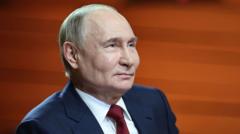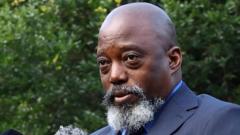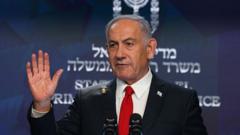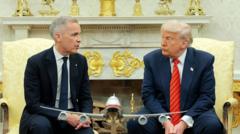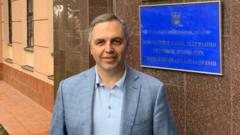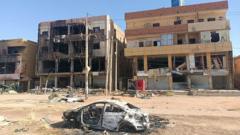The latest U.S. action follows a pattern of ongoing violence in Sudan, where more than 150,000 have lost their lives amid a power struggle, with international accountability growing as the situation escalates.
US Imposes New Sanctions on Sudan Over Chemical Weapons Use in Ongoing Civil War
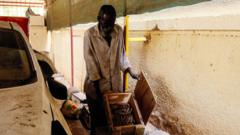
US Imposes New Sanctions on Sudan Over Chemical Weapons Use in Ongoing Civil War
The U.S. State Department has announced additional sanctions against Sudan for its use of chemical weapons in the civil conflict against the Rapid Support Forces.
The article text:
The United States has declared it will impose new sanctions on Sudan following evidence of the use of chemical weapons during the ongoing civil war, primarily against the Rapid Support Forces (RSF). The sanctions, set to take effect on June 6, will restrict U.S. exports to Sudan and impose limits on financial borrowing, according to a statement from State Department spokesperson Tammy Bruce.
Both the Sudanese military and the RSF have faced allegations of war crimes throughout the conflict, which erupted two years ago as the two factions fought fiercely for power. The fighting has resulted in the deaths of over 150,000 people and has prompted mass displacement, with around 12 million people forced from their homes and 25 million in need of humanitarian assistance.
While the specific chemical weapons in question have not been disclosed, reports from the New York Times earlier this year indicated that chlorine gas had been employed on at least two occasions, a substance known for its painful and often fatal impacts. Bruce's statement called on Sudan's government to halt all chemical weapon use and adhere to its commitments under the Chemical Weapons Convention (CWC), an international treaty aimed at the prohibition of such weapons.
Despite Sudan’s agreement to the CWC, the U.S. continues to hold firm on its responsibility to address chemical weapons proliferation. The new sanctions build upon a previous round imposed in January, which targeted leaders from both military factions involved in the turmoil. Sudan's military commander, Abdel Fattah al-Burhan, has been accused of undermining efforts towards democratic transition, a claim met with condemnation from Sudan's foreign ministry.
The head of the RSF, Mohammed Hamdan Daglo (known as Hemedti), was previously identified by former U.S. Secretary of State Antony Blinken as having committed acts of genocide. The political struggle between these factions has led to a humanitarian crisis that has more than doubled the food aid needs among the population compared to the size of London.
As tensions rise, particularly regarding the involvement of the United Arab Emirates, allegations have surfaced claiming the UAE has been supplying arms to the RSF, a charge that the UAE has dismissed. This latest move from the U.S. has been met with critiques suggesting it may serve to redirect attention from growing congressional concerns regarding UAE activities in the crisis.
Further complicating matters, Sudan’s efforts to pursue the UAE for genocide were rejected by a top UN court this month, reflecting the complexities surrounding international responses to the ongoing conflict in Sudan. As the situation deteriorates, the international community continues to grapple with the implications of the ongoing civil war and the human rights violations occurring within its borders.
The United States has declared it will impose new sanctions on Sudan following evidence of the use of chemical weapons during the ongoing civil war, primarily against the Rapid Support Forces (RSF). The sanctions, set to take effect on June 6, will restrict U.S. exports to Sudan and impose limits on financial borrowing, according to a statement from State Department spokesperson Tammy Bruce.
Both the Sudanese military and the RSF have faced allegations of war crimes throughout the conflict, which erupted two years ago as the two factions fought fiercely for power. The fighting has resulted in the deaths of over 150,000 people and has prompted mass displacement, with around 12 million people forced from their homes and 25 million in need of humanitarian assistance.
While the specific chemical weapons in question have not been disclosed, reports from the New York Times earlier this year indicated that chlorine gas had been employed on at least two occasions, a substance known for its painful and often fatal impacts. Bruce's statement called on Sudan's government to halt all chemical weapon use and adhere to its commitments under the Chemical Weapons Convention (CWC), an international treaty aimed at the prohibition of such weapons.
Despite Sudan’s agreement to the CWC, the U.S. continues to hold firm on its responsibility to address chemical weapons proliferation. The new sanctions build upon a previous round imposed in January, which targeted leaders from both military factions involved in the turmoil. Sudan's military commander, Abdel Fattah al-Burhan, has been accused of undermining efforts towards democratic transition, a claim met with condemnation from Sudan's foreign ministry.
The head of the RSF, Mohammed Hamdan Daglo (known as Hemedti), was previously identified by former U.S. Secretary of State Antony Blinken as having committed acts of genocide. The political struggle between these factions has led to a humanitarian crisis that has more than doubled the food aid needs among the population compared to the size of London.
As tensions rise, particularly regarding the involvement of the United Arab Emirates, allegations have surfaced claiming the UAE has been supplying arms to the RSF, a charge that the UAE has dismissed. This latest move from the U.S. has been met with critiques suggesting it may serve to redirect attention from growing congressional concerns regarding UAE activities in the crisis.
Further complicating matters, Sudan’s efforts to pursue the UAE for genocide were rejected by a top UN court this month, reflecting the complexities surrounding international responses to the ongoing conflict in Sudan. As the situation deteriorates, the international community continues to grapple with the implications of the ongoing civil war and the human rights violations occurring within its borders.

